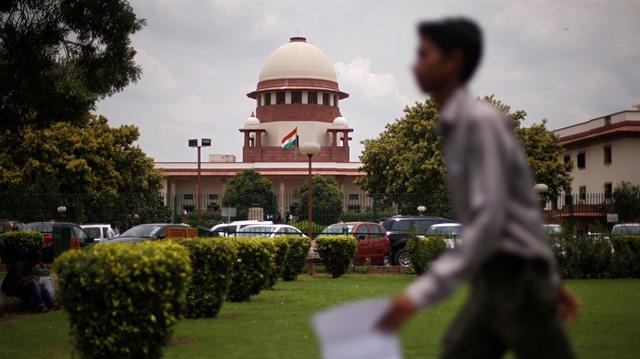
Supreme Court of India adjourns hearing of petition challenging special status of Jammu and Kashmir
Jammu and Kashmir on Monday witnessed a shutdown on the second consecutive day amid fears that India’s top court will revoke a law protecting exclusive citizenship rights.
However, the court on Monday adjourned the hearing of a petition challenging the special status of Jammu and Kashmir that prevents non-residents of the state from purchasing property in the region and thereby maintaining the Muslim majority character of the region.
The case will be heard on August 27.
“The Bench will determine whether the case should be referred to a Constitution Bench. Today, as you see, the other judge is absent and so we have to hear the case another day,” India’s Chief Justice, Dipak Misra, told the petitioners who objected to an adjournment.
Article 35A, incorporated in the Indian Constitution by a 1954 Presidential Order, confers special status to the permanent residents of Jammu and Kashmir, and bars people from outside the state from acquiring any immovable property in the state.
Citing intelligence reports, the local media warned of a possible revolt in the region’s police department if Kashmir's special status was tampered with.
The shutdown was called by the region's pro-Independence leadership.
In a Twitter post, Mirwaiz Umar Farooq, a pro-independence leader, said a strict vigil would be maintained on the situation and that the protest would continue.
Another pro-Independence leader, Syed Aga Hassan, said any effort to “tinker with” the law would create “a Palestine-like situation” in Kashmir.
“A conspiracy has been hatched to change the demography of the Muslim-majority state,” Hasssan said, threatening a massive agitation if that was done.
The petition challenging Kashmir’s special status came from a non-governmental organization “ We the People.”
According to the petition, Article 35 A is against the “very spirit of oneness of India” as it created a “class within a class of Indian citizens.”
Kashmir, a Muslim-majority Himalayan region, is held by India and Pakistan in parts and claimed by both in full. A small sliver of Kashmir is also held by China.
Since they were partitioned in 1947, the two countries have fought three wars -- in 1948, 1965 and 1971 -- two of them over Kashmir.
Also, in Siachen glacier in northern Kashmir, Indian and Pakistani troops have fought intermittently since 1984. A cease-fire came into effect in 2003.
Some Kashmiri groups in Jammu and Kashmir have been fighting against Indian rule for independence, or for unification with neighboring Pakistan.
According to several human rights organizations, thousands of people have reportedly been killed in the conflict in the region since 1989.
Hello, the comments you share on our site are a valuable resource for other users. Please respect other users and different opinions. Do not use rude, offensive, derogatory, or discriminatory language.
The floor is all yours.











